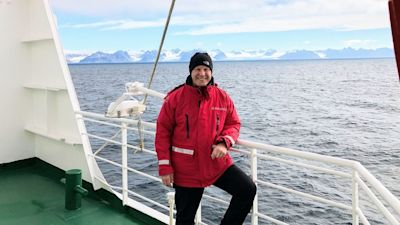Liverpool construction boss on a mission to transform industry

Blog and video report by Andy Bonner
I don't know one person who couldn't do with a decent holiday right now.
So many of us have had to postpone our travel plans after a year when taking time out has never been more important.
It's not just about stepping away from the 9 to 5 and recharging your batteries though; travel gives new perspectives and insight.
Take Neal Maxwell. A few years ago he went to the Arctic with his wife for his 60th birthday.
"We wanted to both experience the natural environment in its most basic form," he told me. "We thought we would only come back with a load of great memories."
Instead, Neal had an epiphany.
"I was staggered by the amount of waste that was washed up on the shores. Each night we would come back to the ship for a lecture by one of the resident scientists. It was really inspiring.
"We learned about the injection of plastic into walrus. We learned about polar bears and how they survive or not and how they end up eating plastic or polystyrene. The bird life, fish, the marine life..."
It wasn't until Neal returned home to Liverpool that he realised how much he had taken in.
"We went to the local supermarket and I just had to walk out. It was row upon row upon row of plastic bottles and product. I thought, this is mad. Why are we still doing this? Then the realisation dawned on me that I had to change something."
After 32 years, Neal wanted to quit his job as a fit-out and construction boss to study marine biology and become a conservationist.
He arranged to meet Jonathan Sharples, Professor of Ocean Sciences at the University of Liverpool.
Over a cup of coffee, the academic quickly persuaded Neal to stay with his company and instead use his position to be heard.
He paired him up with Dr Gareth Abrahams, a former architect and an expert in environmental sciences and planning.
Together, they turned their attentions to plastic and the construction industry they had both worked with.
Dr Abrahams explained: "An awful lot of plastic goes into buildings. A lot of the time we don't even know that it's there. We all know our gutters are made of plastic. That's relatively straightforward because we can see it. Windows, UPVC, made out of plastic. But there's an awful lot of plastic in there that you don't even know. So we need start to think about what things are made of and whether we can swap out for non-plastic or lesser plastic options."
Neal added: "There's a great deal of it in construction. What we didn't realise was how much is in construction. When we actually looked into it we realised construction is second only to packaging when it comes to the biggest users of plastic and the waste that they produce."
According to research for Changing Streams, the not-for-profit company they co-founded, the building trade generates about 50,000 tonnes of plastic waste per year, 40% of which is sent to landfill.
Neal said. "We thought plastic was quite good because it's flexible, it's cheap, it's easy to use and it does a good job. There's a place for it. So why would we want to think anything different? When we realised the impact plastic was having on the environment, we started drilling deeper into it and realised how much destruction we're causing to this precious place we call home. It's frightening. We are generating so much plastic waste and invariably that waste ends up on land fill or in the ocean and it's highly destructive."
A recent report says UK construction's tackling of plastic packaging and waste has significantly improved although we still lag behind other countries.
Neal and Gareth want to persuade companies which employ contractors to commit to reduce their plastic footprint.
They want businesses to join them to raise awareness and help research environmentally-friendly alternatives.
It is a mission which Neal feels he was born to take on.
"It took me to get to 60 to find my purpose," he said. "This is my being. This is what I am. This is what I do. I want my grandchildren to grow up in an environment that is health and clean. We can't continue to work against nature. We've got to work with it."